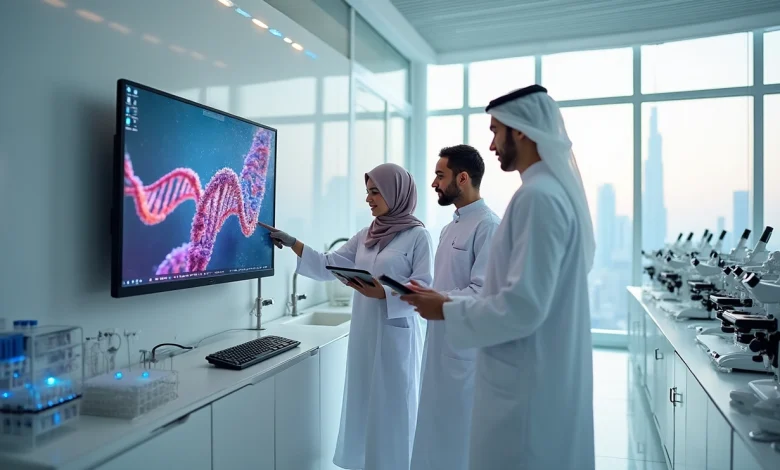
Dubai Health Team Creates First Arab DNA Reference Database
Scientists at Dubai Health have achieved a major breakthrough with their publication of the first Arab Pangenome Reference. This milestone will reshape genetic research throughout the region and advance precision medicine. The groundbreaking genetic blueprint came from Dubai’s Mohammed Bin Rashid University of Medicine and Health Sciences (MBRU) scientists.
The research team used advanced DNA sequencing on 53 people with diverse Arab backgrounds living in the UAE. Their work revealed over 110 million new DNA base pairs and almost nine million small genetic differences unique to Arab populations. The scientists also found more than 235,000 larger structural variations that genetic databases had never documented before. This landmark resource stands out by including various genetic versions specific to the region instead of using a single standard genome. The research aligns with the UAE Genome Project and supports the National Genome Strategy launched in 2023. These initiatives want to enhance personalized and preventive medicine for Dubai’s population.
Dubai Scientists Publish First Arab Pangenome Reference
Image Source: The Brew News
Scientists at the Mohammed Bin Rashid University of Medicine and Health Sciences (MBRU) have achieved a major breakthrough by publishing the first Arab Pangenome Reference in Nature Communications. The team completed this landmark project at MBRU’s cutting-edge Center for Applied and Translational Genomics (CATG).
The research team mapped detailed genomes from 53 people from eight Arab countries – the UAE, Saudi Arabia, Oman, Jordan, Egypt, Morocco, Syria and Yemen. This reference stands apart from standard approaches that use just one “standard” genome, as it contains multiple genetic variants unique to Arab populations.
The team’s technical accomplishment sets new standards. They employed 35.27X PacBio HiFi reads and 54.22X ultralong reads to reach an average contig N50 of 124.28 Mb – 3.11 times longer than the Human Pangenome Reference Consortium’s recent report. The scientists also created ‘PanScan’, a new bioinformatics tool that helps analyze human pangenomes more thoroughly.
“This achievement strengthens the UAE’s position in genomic science. By building a reference that reflects the genetic diversity of Arab populations, we are enabling more precise and equitable healthcare,” said Professor Alawi Alsheikh-Ali, Director General of Dubai Health Authority and co-author.
Researchers Identify Millions of Arab-Specific Genetic Variants
Image Source: MDPI
Recent analysis of Arab genomes has uncovered remarkable genetic diversity that was missing from global reference databases. Scientists found 111.96 million base pairs of previously unknown euchromatic sequences. These sequences were absent from existing human pangenomes, including the T2T-CHM13 and GRCh38 reference human genomes.
The research team’s findings were extensive. They identified 8.94 million population-specific small variants and 235,195 structural variants unique to Arab populations. None of these variants appeared in linear and pangenome references. This new data shows the rich genetic diversity within Arab populations that global genomic databases had missed.
The research yielded another fascinating discovery – 883 gene duplications. The TATA-binding protein gene TAF11L5 stood out because it was duplicated in Arab populations across the board. This gene could affect how other genes are regulated and might explain variations in disease risk and treatment response among Dubai’s population.
The research holds special importance because 15.06% of the identified genes link to recessive diseases. This becomes even more relevant with high consanguinity rates (25-60%) in Arab populations. These insights create new possibilities to advance the UAE genome project and boost genetic diagnosis accuracy.
These discoveries have improved clinical annotation of the human genome. The findings serve as a vital foundation for Arab health initiatives. They pave the way for precision medicine approaches that are tailored to Arab populations’ genetic makeup.
How the Study Advances UAE Genome Strategy and Precision Medicine
The Arab Pangenome Reference bolsters UAE’s National Genome Strategy, a detailed 10-year plan the Emirates Genome Council launched in 2023. This framework wants to speed up solutions that will create tailored, preventive, and precision healthcare through advanced genomic science.
This reference gives scientists the tools they need to develop population-specific biomarkers, disease risk models, and targeted therapies – key building blocks of precision medicine in the region. These advances matter even more because Arab populations have high consanguinity rates between 25-60%, which lead to more genetic disorders.
The Emirati Genome Program, a cornerstone project of the National Genome Strategy, has gathered more than 600,000 samples across the nation. Medical teams have now reached 60% of their million-sample goal. Their work creates a detailed map of genetic and hereditary diseases in UAE’s population.
Abu Dhabi’s Department of Health launched MENA region’s first Personalized Precision Medicine Program for oncology. Market analysts predict the Middle East and Africa’s precision medicine market will grow yearly at 9.96% and reach AED 9.22 billion by 2023.
This research fills major gaps in global genomic databases and ensures that future medical breakthroughs will include data from Arab communities.
The Arab Pangenome Reference marks a transformation in genomic science across the region. Scientists have mapped the genetic blueprint of Arab populations and found amazing diversity. Millions of variants they discovered were missing from global databases. These findings help us understand genetic diseases common in Arab communities better.
Scientists found 8.94 million small variants specific to the population. They also identified 235,195 structural variants unique to Arab populations. This discovery changes how we can diagnose genetic conditions. The team found 883 gene duplications. The TAF11L5 gene showed up in all Arab populations they studied. This gives us clues about diseases specific to the region.
The research has real-life medical uses because Arab populations have high rates of marriage between relatives. Scientists linked 15.06% of the genes they found to recessive diseases. This helps doctors give better genetic advice and create targeted treatments.
The UAE’s National Genome Strategy got a big boost from this breakthrough. The Emirati Genome Program shows the country’s dedication to better medicine with its collection of 600,000 samples. Dubai leads the Middle East in precision healthcare because of these efforts.
Arab populations will now get more accurate diagnoses. Their treatments will match their genetic makeup instead of relying on data from non-Arab populations. Healthcare providers can now create targeted treatments based on genetic information that truly reflects their communities.
The Arab Pangenome Reference fills a huge gap in global genomic science. Future medical advances will address Arab populations’ unique genetic features. This scientific breakthrough lays the groundwork for healthcare where treatments line up with each patient’s genetic profile. It turns precision medicine from an idea into reality for millions of Arab people.






